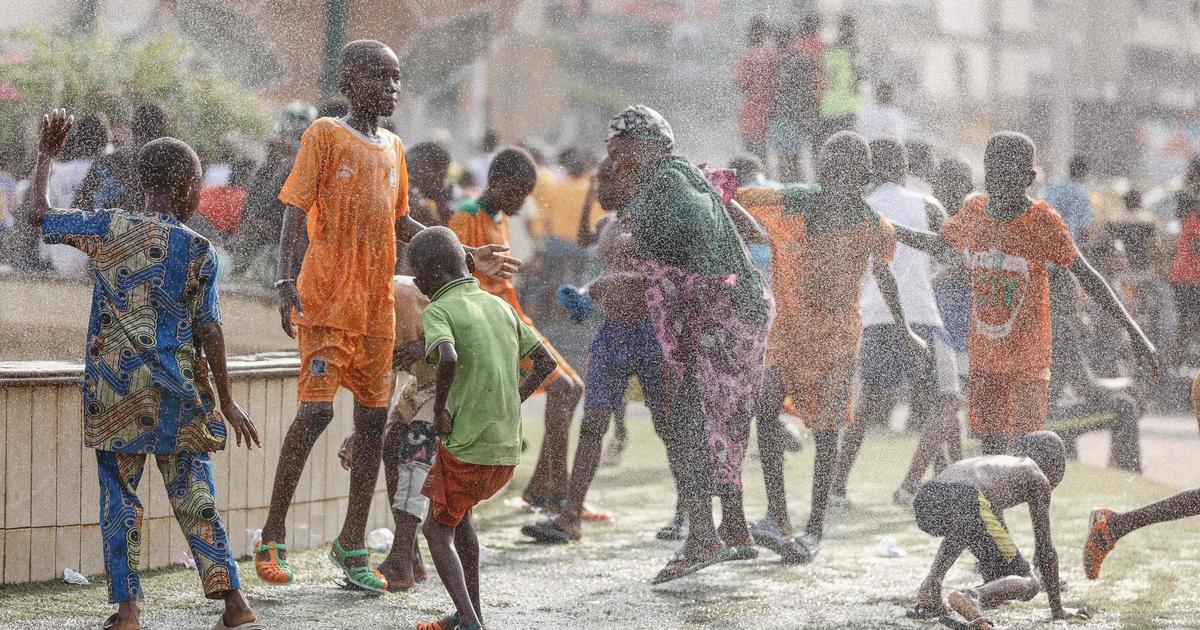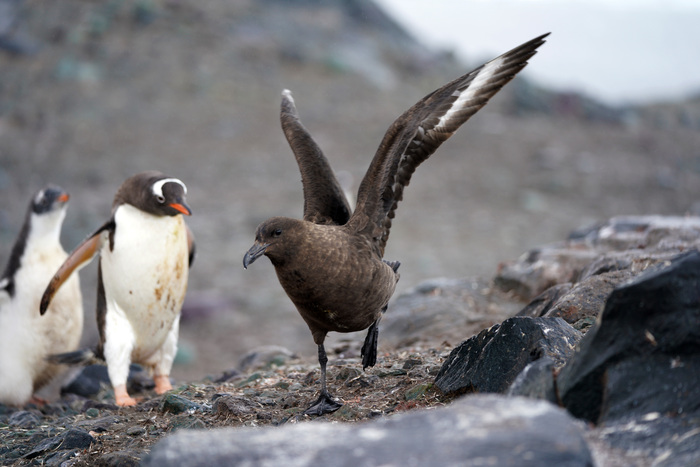Enlarge image
The latest studies show: In the Kibera slum, more than two thirds of the residents have been infected with corona
Photo: Gordwin Odhiambo / DER SPIEGEL
Everything is ready. The disposable gloves are on a small metal trolley, the oxygen masks and tubes hang from the ceiling. A double line runs along the hallway on the floor. Green side: sure. Red side: Infection area, only to be entered with complete protective equipment. But nobody has to slip into a full body suit here. Because there are no patients. Here at the MP Shah Hospital in Kenya's capital, Nairobi, they were recently able to close the entire Covid ward.
“We haven't had to admit a single patient in three weeks. It has never been so quiet since the beginning of the pandemic, "says the head of the infection department Shamsa Ahmed. Four months ago it looked completely different: The delta variant was raging in Kenya, three floors of the MP Shah were filled with Covid patients. “We were on the phone the whole time trying to organize places in other hospitals. Ten patients were waiting for a vacant intensive care bed, ”Ahmed remembers. The bottleneck was announced: In all of Nairobi there are just 200 intensive care places - for more than four million inhabitants.
But the chaos in the hospitals now seems little more than a vague memory. On Monday, the positive rate in Kenya was 0.8 percent. In other words: Less than every hundredth corona test detected an infection. At the height of the pandemic, around every fourth test was positive. The night curfew was recently lifted, the bars and clubs are full, and people are dancing a lot again. The nationwide vaccination rate in Kenya is just six percent. A corona miracle?
At the beginning of the pandemic, all kinds of horror scenarios were circulating for Africa: the cities densely populated, the health systems ailing, hygiene in the slums a challenge. Experts expected the virus to spread rapidly and catastrophic deaths, speaking of a ticking time bomb. At least with the rapid infestation, they were probably right, even if hardly anyone noticed until recently. Because the official case numbers of the Kenyan Ministry of Health were so low that they were not even suitable as a guide. There was hardly any testing, especially in the slums.
New studies have now examined the so-called contamination in African countries. Using antibody tests, researchers have measured how many people have contracted corona since the outbreak of the pandemic. One of the researchers who investigated this question is called Isaac Ngere. He tested thousands of residents in Kenya in several phases, including in Nairobi's largest slum, Kibera.
“In May and June the infection rate there was 66 percent.
That was before the violent delta wave.
I am sure that the values in Nairobi are now over 70 percent.
That's almost herd immunity, ”says the Kenyan epidemiologist who works for Washington State University.
No individual opinion: Other current surveys also assume a contamination of more than 50 percent of adults in Nairobi.
But Ngeres study says something else: “The case mortality was 20 times lower than in other countries, for example in Europe or the USA.
That's astonishing, ”says the Kenyan scientist.
Raphael Juma was also caught right at the beginning of the pandemic. The 32-year-old lives with his two children in a small hut in Kibera. His best buddy suddenly complained of a headache, fever and cough last year. The two of them had themselves tested together for safety, and the call came a day later: positive. "They picked us up and dragged us to a quarantine center, that was hell," he recalls.
Juma made the best of the situation, jogging twice a day in the isolation ward, doing weight training. Sometimes he danced with the nurses, at a distance. The videos of these scenes went viral, giving hope to a whole country. But they also had another effect: “A lot of people saw that and then thought: We'll go jogging and dancing a bit, and then Corona won't harm us. In Kibera, nobody takes the virus seriously anymore, ”says Juma.
In fact, life went on in Kibera even while the rest of the country was in tough lockdown. Hardly anyone wears masks, and social distancing is not realistic in one of the largest slums in Africa. Most of the residents live as day laborers; they cannot just stay at home. And they're young, very young. Half of Kibera's residents are under 15. “Some elderly people mysteriously died during the pandemic. But most of them didn't even notice that they had Covid, «believes Raphael Juma.
A white pavilion has been set up on the edge of the slum, below which a handful of people are waiting to be registered in order to receive a corona vaccination immediately afterwards. Joseph Achieng stands by, he looks satisfied. More and more people are finally ready to be vaccinated, he says. "But many continue to think: We are young and healthy, what is Corona supposed to do to us?" Says the voluntary health worker.
At the moment he is slowly running out of arguments for people to get vaccinated. Because in the entire month of October, the small slum clinic he works for has not recorded a single corona case. In July it was five to eight - a day. Fortunately, there were seldom severe cases. The time bomb didn't explode, at least not with a loud bang. “People just got on with their lives. It's a miracle from God, ”believes the health worker.
The scientist Isaac Ngere has more earthly explanations ready. “The high level of contamination is probably one of the reasons we are seeing so few cases right now. The virus has long since spread, ”he says. But if the majority of the population has already been infected, why were there no horror scenes like in India? Ngere has been investigating this question for months. A common explanation is the young average age of the population. Diseases of affluence such as diabetes and obesity are also comparatively rare, albeit on the rise.
But the epidemiologist has another thesis: “Especially in Central and East Africa, there are many comparable viruses, including similar corona viruses. The residents are exposed to them much more frequently than in Europe, for example. We therefore assume that many have developed a kind of cross-immunity that now also protects against Sars-Cov-2. «His team is currently investigating whether malaria could also trigger such protection against severe Covid courses, because the educated Antibodies are very similar.
There remains a big question mark, which Ngere also admits in his studies: How many people have died of Covid without their death ever appearing in any statistics? "Nobody here gets tested or goes to the doctor for fear of the consequences," says Raphael Juma from Kibera. In the countryside, relatives are sometimes buried quickly without the cause of death being determined. There is no statistical record of excess mortality in Kenya. The Corona miracle should therefore be treated with caution. Some studies suggest that the real death toll in Africa is at least three times higher than officially reported. Even then, the mortality rate would still be below that of Western Europe.
The experts largely agree on two things: The high level of contamination is good news, as it promises a certain level of protection. And yet the vaccination campaign must continue unchecked. “We don't know how long the natural antibodies last. So vaccination is the most effective protection we have, ”says Isaac Ngere. There is also no way around two vaccination doses.
Because while people who have recovered in Europe are only given one dose, this is hardly practical in many African countries, says Richard Mihigo. He heads the WHO African vaccination program. "It is very difficult for us to determine a previous infection for each individual, the effort is far too high," said the expert in an interview with SPIEGEL. Comprehensive antibody tests are hardly useful because they are too expensive and not available everywhere.
So Africa has to keep hoping for vaccines. So far, the continent has not even received three percent of the world's vaccine doses. Nevertheless, the G20 heads of state announced at the weekend full of confidence: It remains the case, 70 percent of people worldwide should be vaccinated by mid-2022. That shouldn't be more than lip service. The heads of government kept silent about how this goal should be achieved in view of the current shortage of vaccination doses.
"We have heard many promises in the past," says WHO vaccination expert Richard Mihigo.
"We now need specific details on how to proceed." After all, there has been progress in the past few weeks, and more and more cans are arriving in Africa.
But in order to achieve the goals set, the amount of deliveries would have to triple.
The manufacturer Biontech recently announced its intention to open a vaccine factory in Africa - but only in mid-2022. "This is a huge step forward for the continent," says Richard Mihigo.
"In order to achieve the 70 percent vaccination goal, however, this will no longer help us if we do not take further measures."
Africa remains a kind of cynical live experiment: Here scientists can observe how the virus spreads largely unchecked.
The WHO is also currently collecting data on infection in Africa.
According to SPIEGEL information, the organization assumes that at least 40 to 50 percent of the inhabitants of sub-Saharan Africa have already been infected with Corona.
"Apparently there were many asymptomatic courses, which probably contributed to the low mortality," says Richard Mihigo.
Nevertheless, they prefer to be ready for a new wave at the MP Shah Hospital in Nairobi.
"This virus will return, that's for sure," says station manager Shamsa Ahmed.
But she hopes that she won't have to cross the red line on the ground again anytime soon.
This contribution is part of the Global Society project
Expand areaWhat is the Global Society project?
Reporters from
Asia, Africa, Latin America and Europe
report under the title “Global Society”
- on injustices in a globalized world, socio-political challenges and sustainable development.
The reports, analyzes, photo series, videos and podcasts appear in the international section of SPIEGEL.
The project is long-term and will be supported for three years by the Bill & Melinda Gates Foundation (BMGF).
A detailed FAQ with questions and answers about the project can be found here.
AreaWhat does the funding look like in concrete terms?
The Bill & Melinda Gates Foundation (BMGF) is supporting the project for three years with a total of around 2.3 million euros.
Are the journalistic content independent of the foundation?
Yes.
The editorial content is created without the influence of the Gates Foundation.
Do other media have similar projects?
Yes.
Big European media like "The Guardian" and "El País" have set up similar sections on their news sites with "Global Development" and "Planeta Futuro" with the support of the Gates Foundation.
Have there already been similar projects at SPIEGEL?
In recent years, SPIEGEL has already implemented two projects with the European Journalism Center (EJC) and the support of the Bill & Melinda Gates Foundation: the “Expedition ÜberMorgen” on global sustainability goals and the journalistic refugee project “The New Arrivals”, as part of this several award-winning multimedia reports on the topics of migration and flight have been produced.
Where can I find all publications on global society?
The pieces can be found at SPIEGEL on the topic Global Society.














